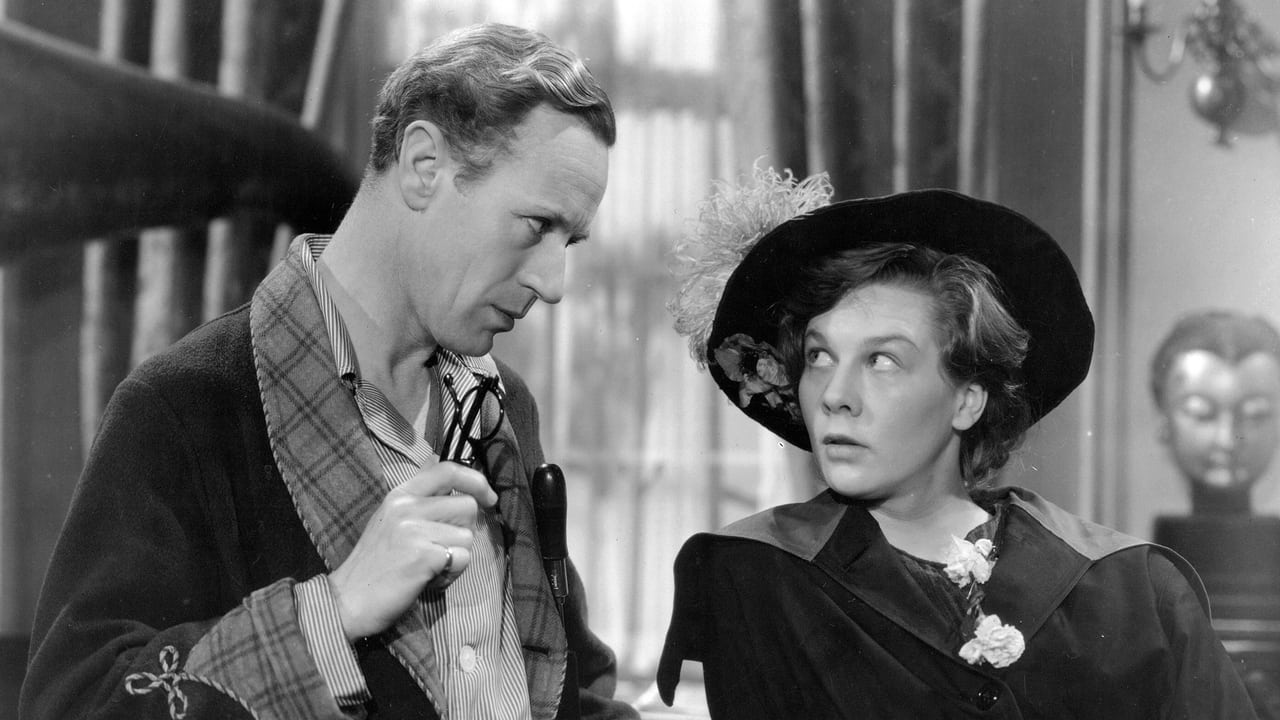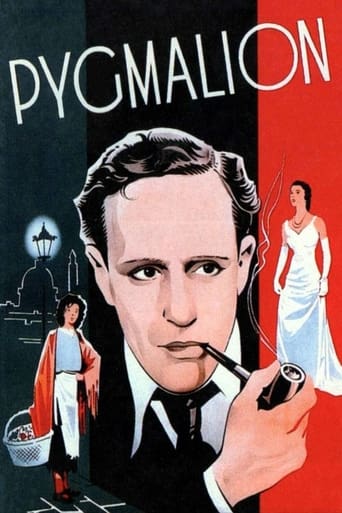

Our play reading group (of retired university peeps & spouses) recently finished Shaw's "Pygmalion" and -- as we often do when available -- show a film of the play we've just read for both our play reading group plus any of the hundred or so other retiree members who'd like to attend.We thought that this 1938 film was absolutely superb. It fully captured Professor Higgins' lack of any personal concern for Eliza, her growth and developing inner conflict, and Col. Pickering's valuable humanity with Eliza. Almost all the characters were very nicely and fully brought to life except, IMO, perhaps one and that's Eliza's father, Alfred Doolittle. While this film does give an initial view of him that's quite adequate (e.g., in his willingness to "sell" Eliza for 5 pounds), it's not quite as detailed or adequate (IMO) as the play in depicting his misery as the recipient of a grant that makes him wealthy. (But that's a small point and perhaps mainly just me.) A TRULY EXCELLENT film -- Wendy Hiller as Eliza is absolutely SUPERB!
... View MoreGeorge Bernard Shaw won an Oscar for his screenplay of "Pygmalion," which he further adapted from his own stage play that had been a huge success. The later musical hit of 1964, "My Fair Lady," was fashioned from this highly successful and popular film production. Other movies have been attempted, but all fall short of this original. Nor can any other musical attempt top the original musical rendition. This film won the Oscar for best screenplay and was nominated for the top three awards – best picture, actor and actress. "Pygmalion" and its stars were up against huge competition that year. I think Leslie Howard's Professor Henry Higgins was as good as Spencer Tracy's Fr. Flanagan in "Boys Town." And, Wendy Hiller's Eliza Doolittle was as good or better than Bette Davis's "Jezebel." The supporting cast of "Pygmalion" were all very good. Most notable were Wilfrid Lawson as Alfred Doolittle, Marie Lohr as Mrs. Higgins, and Scott Sunderland as Col. Pickering. This is a wonderful movie that all should enjoy. It's a good companion to the more popular 1964 musical. But before or after watching that film, watch this original movie version of Shaw's play as well. It is the prototype for all renditions put on film. One would be hard pressed to find better acting for this story anywhere.
... View MoreAt first I was doing research and couldn't help but notice that something was familiar about this flick. As the first establishing shot of the town faded in, one building had gigantic pillars and that is when it hit me. MY FAIR LADY. Same story, honestly only different in some ways, but not too much. This one is not a musical, sadly, but on the bright side it is only and hour and a half, as opposed to three hours as its remake was with Audrey "the beautiful" Hepburn in 1964. The title of this film, staring and directed by Leslie Howard, is Pygmalion (1938).Now, Pygmalion is actually a Greek story of an artist who designs a sculpture of a beautiful woman. He ends up falling in love with her and prays to the gods for her to come to life. Aphrodite granted his wish -the lucky bastard.. But this is what the story is based off of.**Henry Higgins's goal is to teach a down-in-the-dumps gutter-girl how to speak the proper English; the fancy kind. To aide him is a colleague named Colonel Pickering, who is a very easy going lad with very little to say.I really found Eliza (Wendy Hiller) a bit different from Hepburn's. I believe in this film, she gave here character more of a meaning. She starts out as a desperate FLOWER girl who just wants to get by, but also aches to learn how to be more middle-class; how to speak properly; and how to fare. This is shown towards the beginning when they negotiate the terms in which Henry (Leslie Howard) teaches her simple phonetics (the science of speech). -- She is also a tad more passive; she seems more accepting to the change rather than completely pushing it away.As for Henry, Rex Harrison's was excellent, but so was Howard's. He defines his character and makes him truly an arrogant bachelor, who does not even notice his insults that come out of his mouth. You can see that he takes after his mother, but only on the egotistic part. She carries a little more heart on her sleeve, if you know what I mean.One thing I would like to mention is that the EDITING, for its time, is amazing! There are two montage scenes that include fading transitions and dutch-angle close-ups that I cannot help but find sexy.I gave this 1938 film a 8 out of 10. I didn't not give it the extra star because I find the story a bit condescending in a way during the MANY arguments between Eliza and Henry. I just think it was not necessary and could have been more pleasing/gratifying towards the end. Other then that, this film and its story is perfection; a true beauty.
... View MorePygmalionThis is a movie adaptation of the play by George Bernard Shaw; Shaw rewrote the play for the screen and, in my very humble opinion, messed it up. It still is worth watching, though, for people who enjoy intelligence and wit in their movies.We all know the story: 'Enry 'Iggins (ably played by Leslie Howard) picks a flower girl from the gutter (Eliza Doolittle, played admirably by Wendy Hiller), teaches her manners and an upper class dialect, then shows her off in society where she fools everyone. Wendy Hiller was, again in my humble opinion, the best actress of Shaw's time to play his heroines. She was 27 or 28 at the time this movie was made, and she reminds me of Maggie Gyllenhaal in "The Secretary." Hiller really shines as the flower girl with more than spunk.The problem with the movie is that Shaw changed the ending. He also added a dance scene and a character, but they pass without objection. The ending, however, completely changes the play. Shaw had his views, and he was very definite about them. He attacked society and its hypocrisy at every opportunity, and his attacks were more impressive because of their popularity. Among his plays were "Mrs. Warren's Profession" (she was a prostitute, shocking at the time), "Arms and the Man," "Major Barbara," and "Candida." Shaw was awarded the Nobel Prize for Literature in 1925.In "Pygmalion," Shaw punctured middle class morality and England's class system. One of the funniest scenes in the movie takes place after Higgins has taught Eliza the niceties of pronunciation but not of conversation. He takes her to his mother's home, where she meets and converses with Higgins's mother and her friends. Shaw places her interests and vocabulary in the gutter (so to speak), but gives her the precise pronunciation of the upper class as she talks about her aunt being fed gin to revive her until someone done her in. The dialogue is excellent, and the cast perfectly shows the blank-faced confusion of the upper class as they maintain their mannered aplomb.The movie is mostly a witty social satire; you can ignore the social satire which is dated and just enjoy the wit and sparks flying between Eliza and Henry. If you pay attention to the dialogue, you'll be rewarded. However, when we get to the end, the dialogue becomes didactic and things tended to drag a little for me, although Hiller's interpretation of Eliza's lines makes them ring with pride and independence: "I won't be coaxed round as if I was a baby or a puppy. If I can't have kindness, I'll have independence." I'm very disappointed by the ending, though. SPOILERS---------------In the play, there is a poor but upper class character named Freddy who worships Eliza. After Henry shows Eliza off at a royal party, Henry takes full credit for having produced a clever parrot from a guttersnipe. Eliza is outraged that her hard work and personal effort, to say nothing of her native intelligence, are unnoticed by Henry. They argue, giving Shaw's view of the world, and Eliza leaves Henry for Freddy. This is the ending as it should be, although it gives lie to the title.* For the movie, Eliza leaves with Freddy but returns to Henry and fetches his slippers. I can't believe Shaw wrote this, but there it is in black and white. It gives the movie what I presume audiences saw as a happy ending. (The final shot reminds me of the end of "The Man Who Fell to Earth," by the way.) It's not enough of a travesty to wreck the whole movie for me, but it was a disappointment nonetheless.*The story of Pygmalion is given in Ovid's "Metamorphoses." In that story, Pygmalion is an artist who lives on an island. None of the women there meet his standards of virtue, and he carves a likeness of his perfect woman in ivory. The statue is so beautiful he falls in love with it and prays to Venus for the statue to live. Venus hears his plea and grants it, giving life to Galatea. They marry and live happily ever after.
... View More